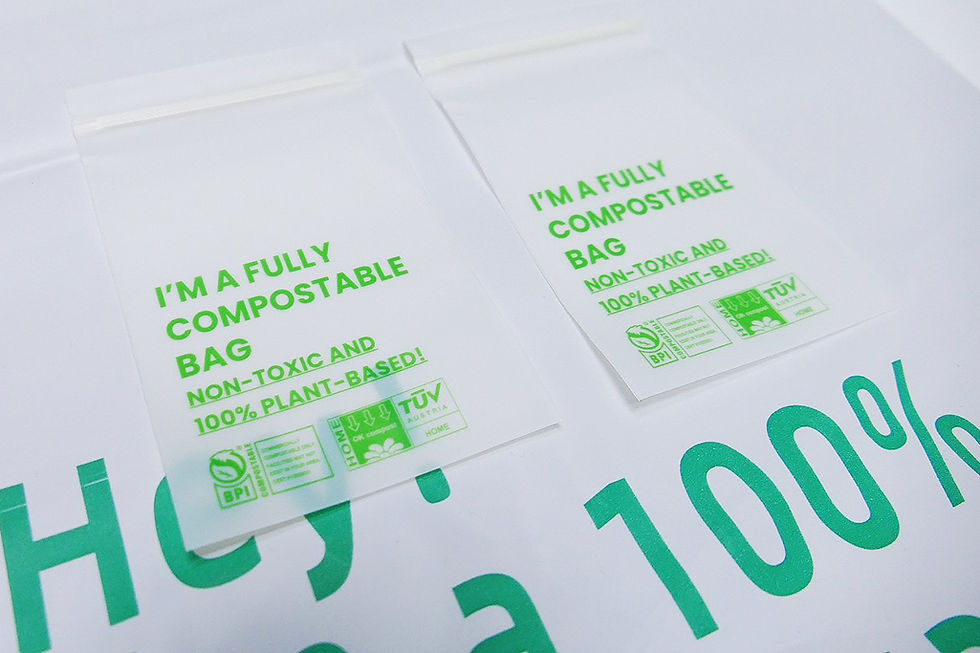Beyond Biodegradable: Why Thai Design is Investing in Truly Compostable Jewellery Packaging
- Thai Design Distributors Ltd

- Aug 12
- 4 min read
From mailer bags to keepsake boxes, the jewellery industry is rife with plastic packaging… But we’re on a mission to challenge the materials that have always been accepted. At Thai Design, sustainability isn’t a checkbox – it’s an ongoing process of assessing our activities, challenging the norm and asking: “Can we do this better?” As such, we’ve been busy re-evaluating what is arguably one of the smallest elements but most frequently used aspect of the jewellery production process: the humble Ziploc bag.

Early Adopters of Change
Several years ago, we moved away from traditional fossil-fuel-based plastics and adopted biodegradable zip-lock bags for the transportation of our materials, components and finished jewellery pieces. They were a more environmentally mindful option than the standard, but not a perfect one. A fact often glossed over in packaging claims is that biodegradable plastics – especially those labelled as ‘compostable’ – require specific and controlled industrial composting conditions to break down effectively. Whilst they are designed to degrade, the conditions necessary for this process (high temperatures, humidity, and microbial activity) are typically not found in home compost bins or landfills.
As manufacturers who value honesty and measurable progress, we began to search for something better.
Thailand, where our crafting facility is based, is a hub of innovation in bioplastics and natural feedstock (raw material used to supply or fuel machines or industrial processes). After extensive research, we discovered Sugarbased, a Thai packaging producer creating biodegradable, compostable packaging alternatives sourced from renewable agricultural waste like the pulpy residue left after the extraction of juice from sugar cane (also known as sugar cane bagasse). Promoting circular principles by using exclusively crop by-products instead of virgin materials, they’re considered leaders in Thai bioplastics. Their packaging products are safe and circular, created to degrade naturally within ~45 days in a landfill or compost, returning nutrients to the soil - offering a solution that transcends buzzwords and delivers genuine environmental benefits.

A Bespoke Jewellery Packaging Solution: Made for Us, and for the Planet
Developing our ideal packaging wasn’t as simple as placing an off-the-shelf order. The sizes we needed weren’t available, so we worked closely with our partner to design new formats from scratch, investing in the tooling and development to make them possible.
The result? A bespoke range of home-compostable zip-lock bags, designed specifically for the needs of our jewellery designer clients. These bags are fully bio-based, which means their materials are made from substances derived from living organisms such as plants and microorganisms; not fossil fuels. We even customised the bag graphics - an opportunity to communicate our values right down to the visual details.
These bags have now passed internal quality and functionality trials with flying colours and are excited to begin testing on a wider scale. Transitioning into exclusively home-compostable bags over the coming year, we’re starting with the smallest bag sizes, which account for most of our packaging volume – before moving onto larger sizes soon.

The Investment of Today, for the Planet of Tomorrow
One of the biggest misconceptions around packaging is that ‘sustainable’ means ‘expensive’. Whilst it’s true that the cost per home-compostable bag is currently higher than the average petroleum-based single-use bag, we believe this order of prioritisation misses the point.
Let’s break it down:
Bag type | Approximate cost per bag |
Basic petroleum plastic (common practice) | £0.006 |
Biodegradable (current state) | £0.021 |
Home-compostable (future state) | £0.032 |
Yes, our future state is more than 5x costlier than the industry standard, but with each bag still costing less than 1p, the real challenge isn’t cost. It’s complexity. Choosing to break the mould and strive for better is a practice in research, experimentation, collaboration and development. It’s time-consuming, but for us, it’s a worthy investment.
The truth is, sustainable business often means seeking options that aren’t obvious or easy to implement. Off-the-shelf solutions are usually cheaper because they externalise their cost - onto the environment. In a global jewellery supply chain where packaging is often treated as invisible, every choice counts. As passionate advocates for the prosperous future of our planet, it’s our responsibility to seek what’s right; not what’s easy. We’d rather invest a little more time today, for the benefit of tomorrow.

Looking Ahead: Glassine Packaging and Beyond
Whilst we’re focussing initially on our zip-lock bags, we’re also preparing to replace our larger outer bags with glassine paper - a recyclable, biodegradable and compostable material ideal for protecting bulkier items. With this transition, we’re steadily phasing out fossil-fuel plastics from our operation altogether. No matter how big or small, every piece of packaging leaves a footprint – we’re on a mission to shrink ours.
It’s important to mention here sustainability is a journey that never truly ends, but we’re not here to claim perfection – we’re here to learn and help pioneer change. From researching the market and investing in custom tooling to co-creating new bag sizes and overseeing internal testing, we’ve put in the work to make a lasting difference; one that will start to gather momentum as our bespoke zip-lock bags begin to reach our jewellery clients across the globe.
We’re proud to play a small part in a much bigger shift.
Would you like to partner with a manufacturer who takes environmentally sustainability seriously? Get in touch today to find out how we can support you in manufacturing jewellery for your ethical jewellery brand – caring for details from product to packaging.




Comments